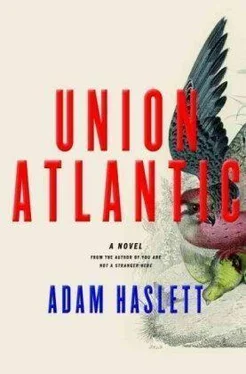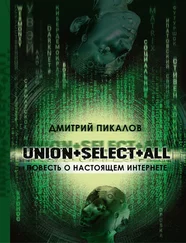Hal, for reasons he couldn’t later recall, had been in search of twine and a shovel when, at about this time, he flipped the switch on the garage-door opener. The panicked sheep fled as if from the abattoir, waddling at a clip across the drive, bleating as they went, only to be penned again between the tents, driven into the rear of the gathering crowd, who turned in astonishment at this sudden outbreak of the agrarian. When an EverSafe Security employee drew a semiautomatic from under his jacket and held it down toward the shaggy, neglected creatures, a vegan sophomore from Vassar standing nearby cried “Terrorist!” at the top of her lungs. No sooner had she uttered the word, than champagne flutes were tossed aside and crushed under foot as the guests toward the front, blind to the nature of the threat, were sickened by the sudden knowledge that their decision to avoid city crowds had failed to deliver them from danger, and with no other direction to go they hurried down the slope into the grass, scattering toward the woods and the pond and roadway. Others closer to the incident merely returned to their tables, baffled as to the origin or meaning of the episode. For a while, mild chaos reigned, Glenda trying desperately to conscript the guards as shepherds, while some of the younger and more inebriated guests, amused at the folly, began feeding the sheep the remainders of the peanut-butter parfait. Nerves shot, the animals began shitting profusely, on the grass, on the dance floor, on the feet of exhausted partygoers, who sent up new cries, the stink thrown off by the steaming piles mixing with the stale scent of the machine-cooled tents to give what remained of the gathering the air of a barnyard in autumn or early spring.
Emerging onto the terrace, Nate encountered a ewe working a drainpipe loose with the scratching motion of her tubby white flank.
“You!” a man in a baggy gray suit called out. “Have you seen my sister?”
“Shit,” he said, recognizing Ms. Graves’s brother from one of his visits to her house. “I’ll find her.”
It seemed to take forever to wade through the milling crowd. Eventually, he managed to circle around to the parking area, where by the gate he finally saw her. She walked stooped forward and with great effort. When he reached her he saw she had bright-red scratch marks lined all up and down her arms and legs and one across the side of her neck.
“Ms. Graves, the dogs, they’re inside, they’re fine. It’s my fault. I wanted to feed them.”
Tears welled in her eyes, though her kindly, pained smile never faltered.
“These people don’t clear their underbrush,” she said. “There’s a nasty patch of briars in there. A few hours with the clippers is all I’d need.”
Lending his arm for support, he walked her slowly up the path.
“What on earth are you doing here?” she asked. “Don’t tell me these people are your friends.”
No sooner had he found a chair for Charlotte back up on the lawn than Mrs. Holland once more ascended the little riser, waving her arms and calling out to whomever remained to please, please, hurry up and watch. The bleary faces of a few stalwart celebrants turned just in time to see the barge on the pond explode in one single, hammering burst, the flames from the blast shooting twenty or thirty feet into the air before dripping back into the water like burning fuel, and so too over the dry grass, which began at once to burn.
The heat kept on through July. On the Finden High playing fields, soccer-camp kids drilled from steamy morning to hazy afternoon, and the unfortunates remanded to summer school sweated it out in the same remorseless classrooms they’d tried all year to avoid. Mold flourished in unfinished basements and in the trunks of parents’ old cars littered with sodden swimsuits and damp towels smeared in suntan lotion and the remains of spilt beer. The moisture dampened even the sound of traffic, which in the normal course of events would have lessened once the semester ended, but school exchanges had been canceled in the wake of 9/11 and family vacations to Europe called off. Parents told kids to get summer jobs and pulled back from the promise of cars for college. You heard stories of people’s moms and dads being laid off from office jobs that if you’d ever bothered to contemplate seemed eternal in their boredom. The town put out the usual flags, and the flowers beneath them bloomed. And for all the worry shot down the cable wires, for all the jokes about duct tape and the town police cordoning off the baseball diamond to detonate a grade-schooler’s lost knapsack, for all the hours of news spooling tape on the dirty bomber and Saddam’s vast arsenal and the tall, smiling Satan eluding our might in the mountains of some hopelessly foreign country, the drama club still had its bake sale and the library still sold books out on the sidewalk from noon to three on weekends, and you still wished for a clarifying rain at the end of each sweltering day.
Such a rain arrived on the Friday afternoon two weeks after the party, just as Nate was getting to Ms. Graves’s house. She led him into the living room and took a seat in her usual spot on the couch. In the stifling heat, the room’s disarray was strictly oppressive, the mounds of clutter like plants rotting in a jungle. None of this would ever be cleared away, he thought, not as long as she remained rooted here.
Her voice lacked its usual force and she often paused in her meandering discourse, which contained no more breathless jeremiads. She spoke awhile of Dewey and the spread of primary education, but he could tell her thoughts were elsewhere.
“You needn’t worry,” she said after a particularly long silence, during which he’d noticed the scabs still visible on her shins. “I know you aren’t studying for your exam anymore. You’ve been good to indulge me like this. I know I’ve bored you.”
“That’s not true,” he said, gnawing at the blunt end of his pen.
She gazed past him out the window.
“I’ve been thinking of birch trees for along the riverbank. What do you think? Perhaps a mix of things would be better.”
On his way over, Nate had tried telling himself that the documents wouldn’t matter, that she had already won her suit. But the excuse seemed thin now; Doug wouldn’t want the files if he couldn’t gain something by them.
“In any case, I’ll make us some tea.”
As soon as she left the room, he began darting from one pile of paper to the next, keeping a close eye on the door. He gathered bank statements, tax records, notarized letters, and anything else from that mass of print which seemed relevant. On a stack by the fireplace he saw a manila folder labeled “Society Minutes” and he shoved it in his knapsack along with the rest. His only thought as he went about his task was a disavowed one: that losing his father permitted him this moral lapse. As if, in some grand ledger, his loss had earned him a pass or two.
Ms. Graves returned carrying a tray of tea and biscuits.
“I’ve been returning to Whitman,” she said, as she poured them each a cup. “He’s right about most things. But if you take him to heart, you can’t always read the poems in your favor. He has this way of looking back at you. Here’s one I came across this morning. ‘To a Historian.’”
She put on her reading glasses and recited the lines in a slow, reflective voice.
“‘You who celebrates bygones, / Who have explored the outward, the surfaces of the races, the life that has exhibited itself, / Who have treated of man as the creature of politics, aggregates, rulers and priests, / I, habitan of the Alleghenies, treating of him as he is in himself in his own rights, / Pressing the pulse of life that has seldom exhibited itself, (the great pride of man in himself,) Chanter of Personality, outlining what is yet to be, / I project the history of the future.’
Читать дальше












